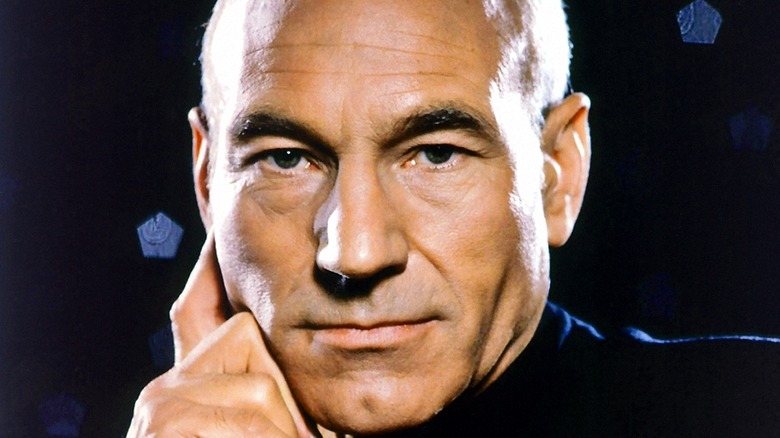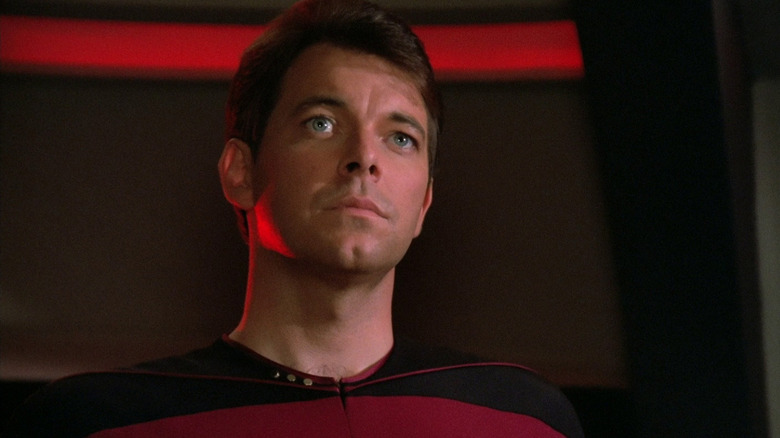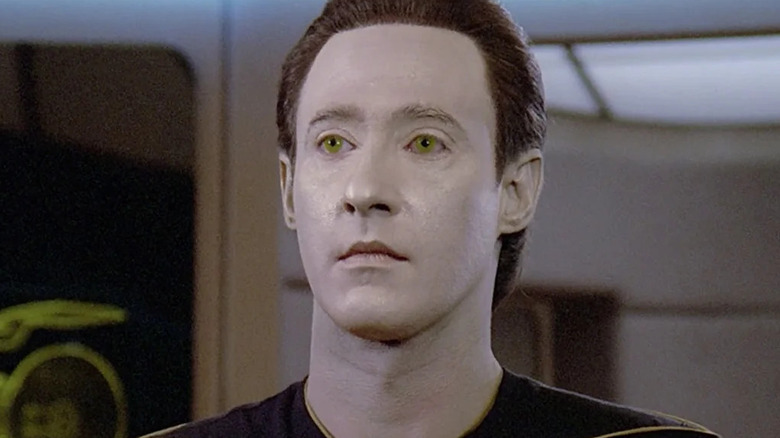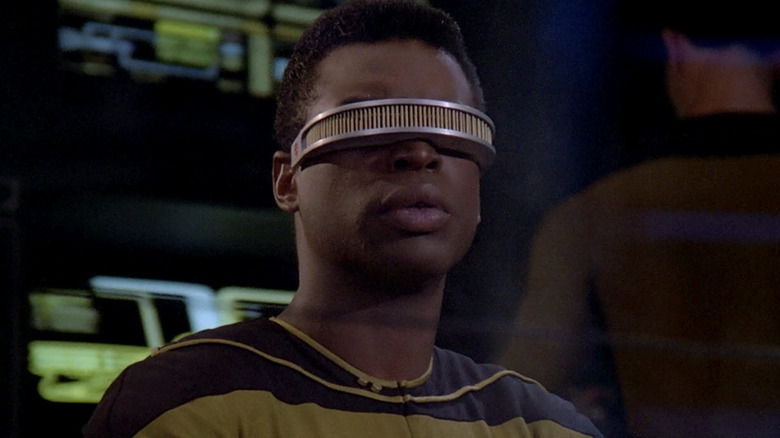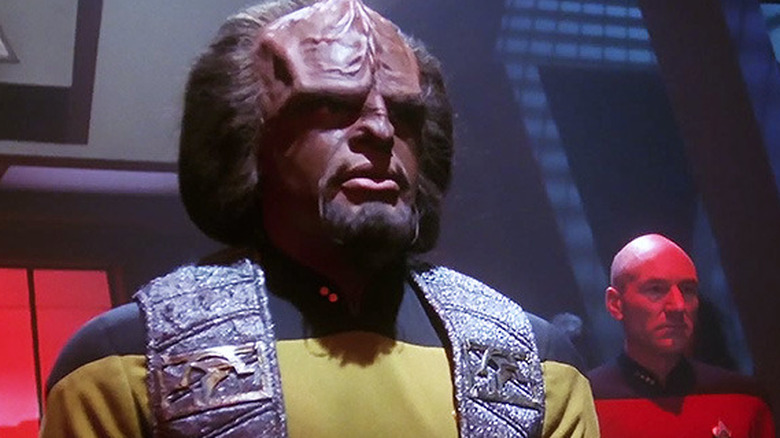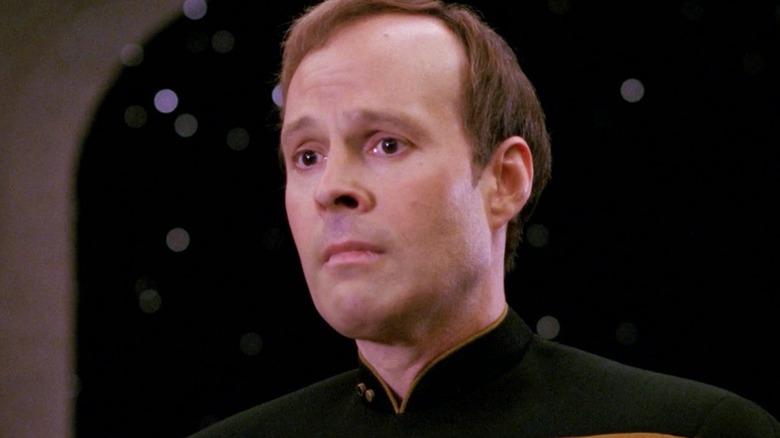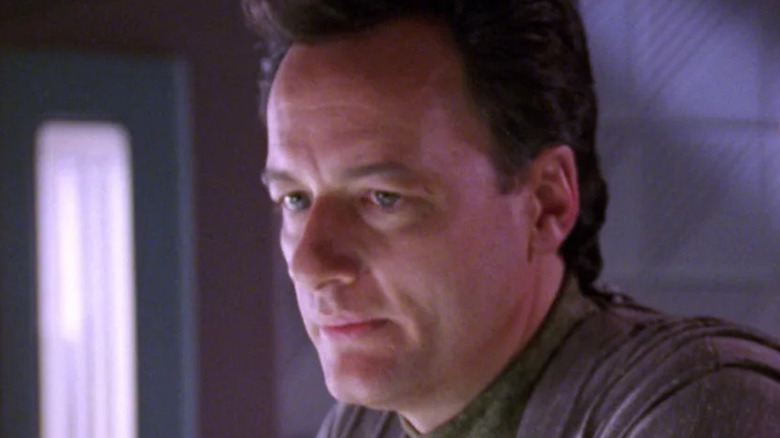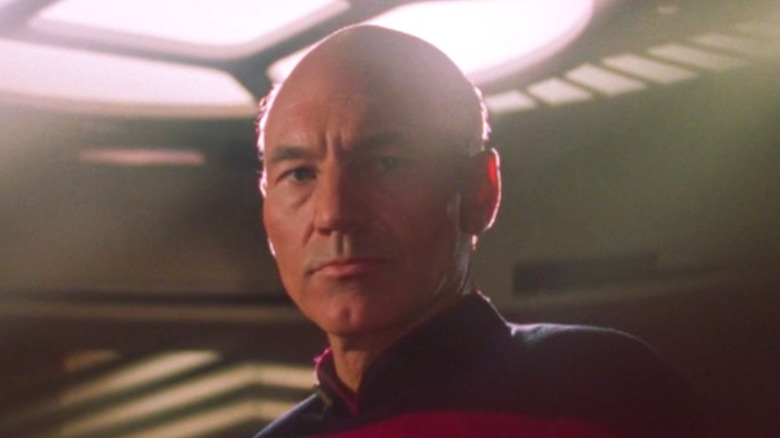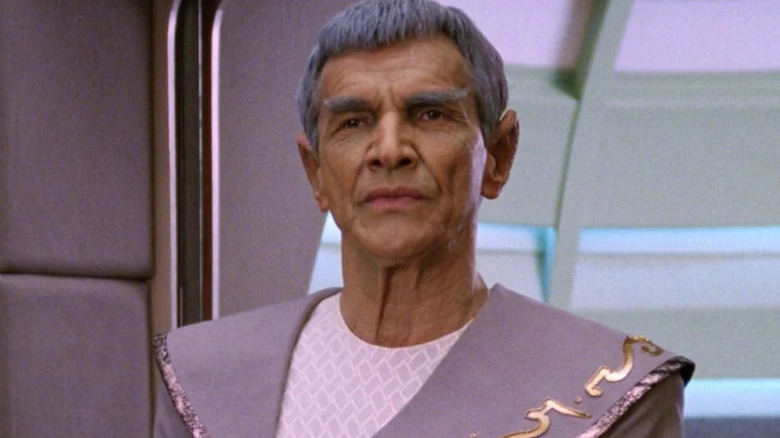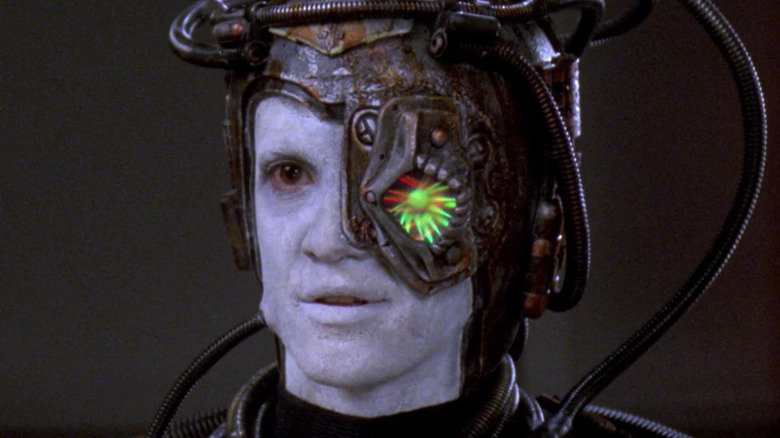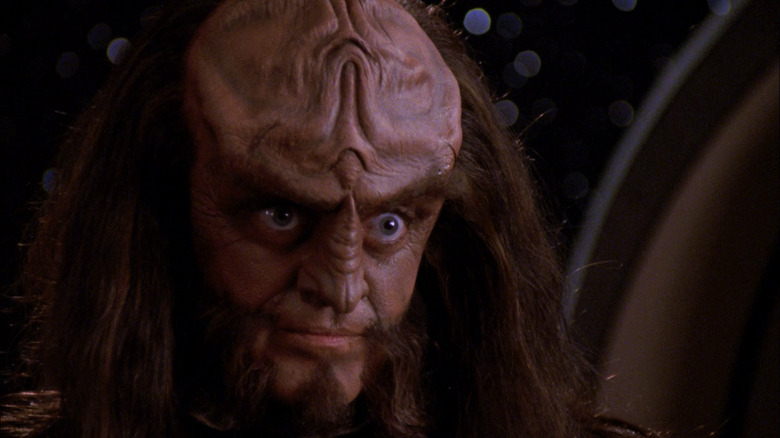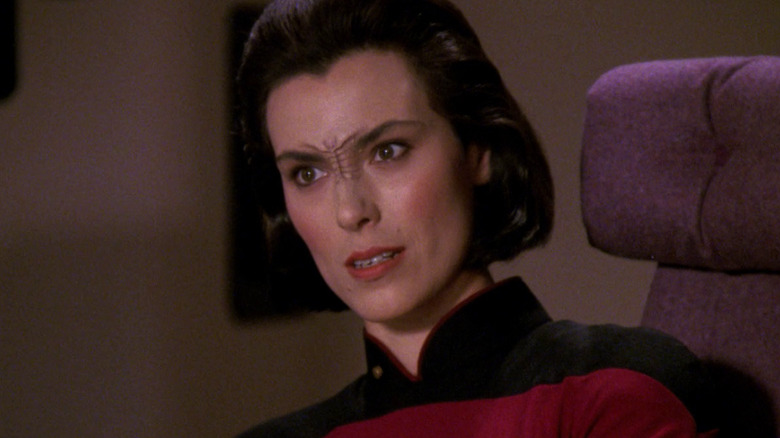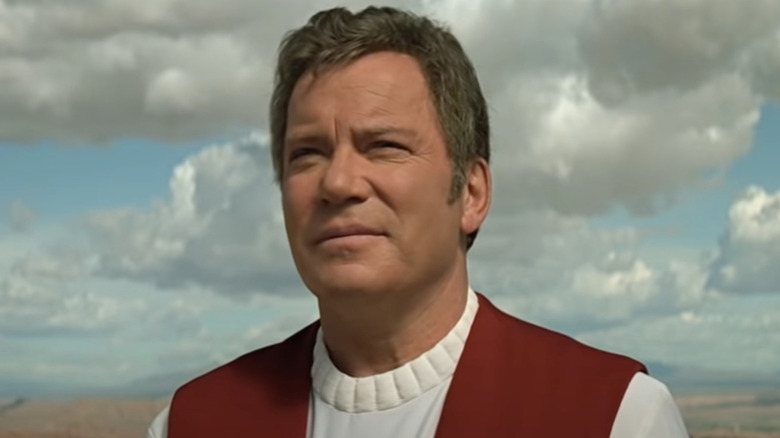The Best Decisions Captain Picard Has Ever Made In Star Trek
Captain Jean-Luc Picard of the starship U.S.S. Enterprise led the Federation flagship for seven seasons on "Star Trek: The Next Generation" and for four follow-up feature films. He became an Admiral and then an Ambassador before returning to screens in 2020 for his own series, "Star Trek: Picard." Our pick for best Enterprise captain in the history of the franchise (beating out even James T. Kirk), Picard has become a science fiction icon, a television legend, representing everything that's good, right, and moral about "Star Trek."
Over his long tenure as captain, he's had too many tough calls, choices that very well could have decided the fate of billions. From how to stop galactic super-beings, to whether to intervene in an interstellar war, his choices had countless life-or-death consequences. But given his outstanding moral fiber and sense of honor it should also come as no surprise that most of Picard's most important decisions as Captain of the Enterprise have involved choosing to help other people, from alien races in dire straits to a crew member in need of a hand. From his first days on the Enterprise, to his final mission, here's our list of the best decisions Captain Picard has ever made in "Star Trek."
Making William Riker his number one
In the series premiere of "Star Trek: The Next Generation," Riker first meets his new captain in a ready room and is given his first order right away. Picard shows almost no regard, simply telling Riker to command the manual docking of his new ship's saucer section with its secondary hull. It's an order given sternly, and sets the tone for Picard as a cold, by-the-book commanding officer. But over the course of the series the two would form one of just a few genuine friendships for Captain Picard, and his choice to appoint him his first officer would alter the trajectory of his life.
In that same first episode, one of Picard's next acts as captain was to instruct his new number one to prevent him from embarrassing of himself in front of the crew, particularly with children. Though Riker's main role early on seems to have been to ensure the captain's image as a respected authority figure, it's his relationship with Picard that would help the captain loosen up. Over the course of the series, Riker would help Picard — a 22 year veteran as a starship captain — go from a stoic stick-in-the-mud who preferred to stay an arm's length from his crew, to a man with friendly relationships with those under his command. This trend would continue as he evolved into the man seen in "Star Trek: Picard," where he is shown to have much more casual friendships with the likes of Raffi and Rios — and it's all thanks to Riker.
Defending Data's rights
One could argue that, like Riker, the mere act of recruiting Data to serve as his helmsman would be as big a decision as any as Picard made, but the Soong-type android had a long and distinguished service record that would warrant just about any starship captain bringing him aboard. But while other officers may have seen Data as a mere machine — a robotic humanoid capable of great feats and able to pilot their starship and provide scientific analysis for them — it was the rare nature of Captain Picard and those on the Enterprise who saw him as so much more.
Aboard the Enterprise, Picard and his crew — save perhaps the acerbic and cynical Katherine Pulaski — saw Data as a person, and when his rights as an individual came under attack, they leapt to his defense. And when Data was ordered to be turned over to Bruce Maddox as property of Starfleet in "The Measure Of A Man," it was Picard who was at the forefront of the fight, demanding they could judge and decide his status. It was Picard who acted as his defense counsel, in one of the most important acts he'd perform as captain, an act with consequences that continue to reverberate through the "Star Trek" universe even today.
Promoting Geordi to chief engineer
In the first season of "The Next Generation" there didn't seem to be any set chief engineer on the Enterprise, with at least three different officers who served in the role. But in the second season premiere Picard would promote helmsman Geordi La Forge to the permanent spot of head of the ship's engine room. To audiences, it seemed like an odd jump for the young officer, but it proved to be one of the key changes on the ship after its first rocky year.
La Forge went on to become one of the standouts on the series, and was even ranked by ScreenRant as the franchise's best engineering chiefs. He'd solve crisis after crisis — including several galactic threats — and it never would have been possible if he'd stayed a mere pilot, or been moved to a different post. In at least one alternate future timeline he became Captain La Forge of the starship Challenger, and he owed it all to Picard putting blind faith (pun intended) in his skills as an engineer.
Fighting for Worf's honor
One of the most unexpected turns of events in the entire run of "Star Trek: The Next Generation" occurred in the third season episode "Sins Of The Father." Essentially a sci-fi political drama, the episode brought the action to the Klingon homeworld with the sudden accusation of treason levied against Worf's dead father Mogh. Turning up on the Enterprise is Worf's long-lost brother Kurn (played by Tony Todd of "Candyman" fame), who wants Worf to travel home and defend their family's honor. But when Kurn is the victim of an assassination attempt, Worf finds himself alone — and Captain Picard steps in to help. Not as captain of the Enterprise, but as a trusted friend.
With Picard's assistance, new startling evidence is discovered, along with a direct eyewitness that clears Worf's father of the crime. To prevent a civil war however, Worf takes the fall, but averts a death sentence — thanks to the evidence Picard revealed — leaving justice for another day. But "Sins Of The Father" ignites an ongoing story that would continue for nearly a decade, with effects that would run through two different "Star Trek" series'. None of it would have been possible without Picard's valiant assistance on that fateful day when he saw Worf in need of his help. Had he not stepped in, Worf might very well have ended up on the wrong side of an executioner's blade.
Not giving up on Barclay
In season three's "Hollow Pursuits" we met a very unusual Starfleet Officer: Lieutenant Reginald Barclay. Popular among fans, Barclay was nothing like the officers audiences had seen before. Far from the steady, skilled, and strong capable men and women of Starfleet, Barclay was awkward, clumsy, and lacking in confidence; he was a social misfit and outcast who struggled to fit in among the more gregarious and bold crew of the Enterprise. When it became known that he wasn't measuring up, Commander Riker wanted him off the ship, insisting he had no place on the Enterprise, and suspecting that Barclay's previous commanders might have given him recommendations just to get rid of him. Troi tried to help in her capacity as counselor, and even Guinan attempted to advise him, but it didn't seem to be making a difference.
But just when it seemed like Picard might follow Barclay's previous captains and send him packing, he decided to do something nobody had done before: reach out to Barclay with a caring, compassionate helping hand. Instead of transferring the so-called problem officer, Picard instructed Geordi to "become his best friend." Eventually, the crew came to appreciate Barclay for his unique talents and skills, and together helped him come out of his shell. Barclay would go on to become a valuable officer, even getting several episodes of his own.
Giving refuge to Q
The villainous Q was initially presented as a malevolent godlike entity with sinister but mysterious motives. He tormented the crew in the premiere episode and popped up again attempting to turn Riker into a fellow god. In "Q Who" he flung the Enterprise into a far-off region of space, introducing them to the Borg and setting up one of the greatest enemies in the franchise. It's hard to underestimate Q's importance to the series, but he even showed up later on "DS9" and in a trio of episodes of "Star Trek: Voyager." But it's in the third-season episode "Deja Q" that Picard makes his most important decision regarding the all-powerful Q.
Exiled from his own people, Q was turned into a mere mortal, and sought refuge on the Enterprise. When he became the target of a vengeful alien race, Picard chose to help him, and provided Q with a safe haven. It wasn't an easy call, and few would have blamed him if he hadn't, particularly as Q's presence proved to be a danger to the ship. But helping Q showed the trickster how special humans — and Picard — really were. Q later felt he owed Jean-Luc a debt of gratitude he'd repay in "Qpid," "Tapestry," and in the series finale, "All Good Things," helping him learn life lessons and save mankind, too. Had Picard not intervened, we also may never have witnessed the Q civil war on "Voyager" — nor his return in Season 2 of "Star Trek: Picard."
Helping the Mintakans
"Who Watches The Watchers" may be one of the most quintessential episodes of "Star Trek: The Next Generation." It has everything you want in a "Trek" story: a big problem, a tense situation, a moral and ethical dilemma, and even a debate over the prime directive. It all starts when a secret Starfleet research team is discovered by a pre-industrial society called the Mintakans, and in the ensuing confusion where the Enterprise comes to assist, begin to believe that Picard is an all-powerful god. The prime directive demands they not interfere, but the damage is done, and while the Starfleet expert advises they hand down a set of religious tenets to mitigate the damage, Picard outright refuses.
Instead, the captain speaks directly to the primitive people and plainly explains the situation. It isn't easy, and to help them understand that he's not a god, Picard is willing to sacrifice his very life. In the end, the Mintakans begin to understand the truth of what happened, and agree to go their separate ways — but not before gifting Picard with a hand-woven tapestry to remember their time together. Above all, "Who Watches The Watchers" helped show just what a good and principled man Picard was, but the decision to help the Mintakans instead of abandoning them had a profound effect on him. The fact that he kept their gift in his quarters, even into his years on the Enterprise-E and more recently in his French villa on Earth in "Star Trek: Picard" shows just how important that experience was for him.
Mind melding with Sarek
One of the first major guest stars to appear on "Star Trek: The Next Generation" who originated in "The Original Series" was Mr. Spock's father Sarek. The elder Vulcan Ambassador had appeared in "Journey To Babel" in the 1960s, and in three of the five feature films before he made a grand entrance in the season three episode titled simply "Sarek." Coming aboard the ship to conduct final negotiations with a mysterious alien race, it's soon discovered that the aging Vulcan is afflicted with a rare disease that is sapping him of his mental abilities — and his logic. In the climax of the episode, Picard selflessly agrees to a dangerous mind meld with Sarek in order to help stabilize his condition so he can follow through with his final mission.
The meld is a success, but not without consequences, and Picard undergoes some serious trauma as a result. The meld is subtly referenced in subsequent episodes, as Picard's joining with Sarek's mind gives him a more centered and measured sense of control, as well as the ability to perform the Vulcan nerve pinch in "Starship Mine." It also gave him a profound connection to Ambassador Spock, who he'd meet — and meld with — in the episode "Unification," which in turn may even have helped fuel his desire to help the Romulans in the follow-up "Star Trek: Picard."
Rescuing Hugh
When the Enterprise first made contact with the Borg they were shown to be little more than a robotic hive mind, intent on absorbing life into their collective. Like a virus, they would spread their cybernetic race to all corners of the galaxy — and it seemed that humanity was next in line. But in the episode "I, Borg," Doctor Crusher convinces Picard to bring aboard an injured and dying drone they find at the site of a crashed Borg ship. Initially Picard — who was once assimilated and turned into a Borg himself — wants to use the drone as a weapon against the collective, using an invasive computer program to sabotage their entire network. But as the Borg recovers, it begins to show signs of individuality, eventually taking the name Hugh, and showing an unusually strong moral compass.
Ultimately, Picard chooses to respect Hugh's right to autonomy and lets Hugh make his own choice about his future. Hugh decides to return to the collective, and Picard's greatest hope is that Hugh's sense of self and good morals could be just as contagious to the Borg as any virus. Hugh would return to lead a group of Borg revolutionaries in the two-part episode "Descent" and eventually turn up in "Star Trek: Picard" where he led a massive project to help ex-Borgs recover their former lives. It's an incredible humanitarian initiative, and it would never have been possible if Picard hadn't chosen to help save Hugh in the first place.
Getting involved in the Klingon civil war
Throughout the fourth season trouble was brewing in the Klingon Empire, beginning with the death of the former Chancellor K'Empec. When it's determined that Duras — the same man who had framed Worf's father — was guilty of the assassination, and Worf murders him for killing his beloved — the mysterious Gowron is named the new chancellor. But Duras' powerful family haunts the Empire, and it all comes to a head in the two-part season ender, "Redemption." With Gowron about to be take his place as leader of his people, the House of Duras, with the outside help from the Romulans, attempts to take control themselves. Torn in between his people and his duty, Worf sides with Gowron and asks Picard — and Starfleet — join him.
Unable to get directly involved in what is deemed "an internal Klingon affair," Picard instead hatches a plan to expose the Romulan alliance with the House of Duras. The plan works, Gowron is installed as Chancellor thanks to Picard's help, and Worf finally regains the honor he had lost in "Sins Of The Father." It's a bold and risky move for Picard, but it sets of a chain of events off that would have after effects for years, spilling over into "Deep Space Nine" years later, as Gowron owes much of his legacy to Starfleet and Picard's assistance.
Trusting Ensign Ro
Brought into the series in season five to shake up the crew, Ensign Ro Laren may have wound up an unresolved plotline, but she began as an angry, bitter Bajoran doing time in a Federation penal colony. Recruited by a corrupt admiral to assist in a mission to help locate a supposed Bajoran terrorist, Laren was brought to the Enterprise against Picard's explicit objections. But when Ensign Ro uncovered a plot to supply Cardassian militants with illegal weapons, she didn't know who to trust. With help from Guinan though, Laren placed her faith in Captain Picard to help her out of the situation. Rather than toss her into the brig for taking part in a corruption scandal, or sending her back to the stockade when it's all said and done, Picard — impressed by her integrity — asks her to remain on the Enterprise.
It may have seemed like an obvious choice for viewers in the moment, who saw Ensign Ro distinguish herself in the episode, but she was coming from a Federation penal colony, and at the start of the episode was despised by most of the crew for her less than stellar reputation. Giving her a position on the bridge of the flagship of the Federation was a risky call though, and it paid off in spades, and Laren became a standout officer. Over the course of the following seasons, she'd become an incredibly valued member of the bridge crew, and a fan-favorite on the series.
Bringing back James T. Kirk
When "Star Trek: The Next Generation" first debuted in 1987 it was living in the shadow of the original "Star Trek" series, and Picard himself was being measured harshly against his counterpart, James T. Kirk as played by franchise legend William Shatner. Thankfully, Patrick Stewart played the role with aplomb, comparisons were favorable, and Picard eventually became equally as beloved in his own way. In the first "Next Generation" film in 1994, "Star Trek: Generations," the two captains of the Enterprise would come face to face, thanks to a fateful decision by Captain Picard.
With both captains having encountered the mysterious energy anomaly called "The Nexus," parts of their souls were forever trapped within. When Picard attempts to escape and stop the villainous Soran from destroying planet after planet on his own diabolical mission, he discovers Kirk inside the Nexus, and recruits him for the task. Together they stop Soran, and in the melee, Kirk dies at Soran's hands, but saves millions of lives in the process. The decision to bring Kirk back for one more mission may be the most important choice he ever made. Not just to save lives, but to give Trekkies the moment they'd been waiting for: the meeting of the two best Enterprise captains.
